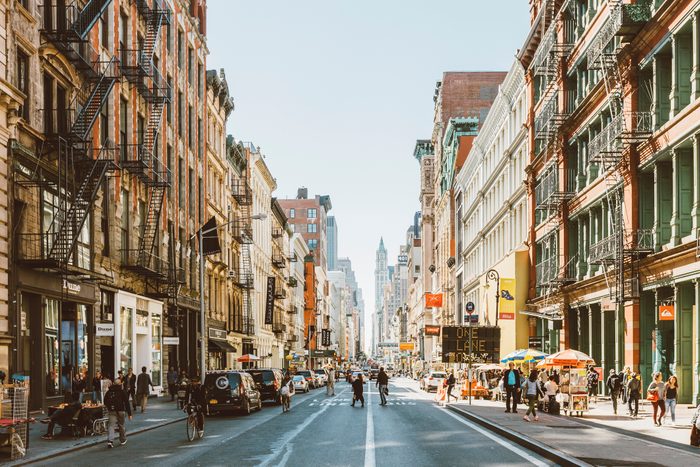
Public places doctors avoid during coronavirus
If you’re feeling restless staying cooped up inside these days, you’re not alone. Living in coronavirus lockdown isn’t easy for anyone. And now that most states have lifted many of their outdoor restrictions, it can be hard to know where exactly it’s safe to venture outside. “The highest risk places for Covid-19 transmission are indoors and those that are crowded,” says Sarah P. Cate, MD, assistant professor of surgery at the Icahn School of Medicine at Mount Sinai in New York. “Low-risk places are outside where people are also masked and have space to socially distance,” she explains.
Inevitably, the summer can bring a lot of challenges, especially in places like Florida, says Dr. Cate, which is still in the escalation stage of the virus. “A beach with a face mask on and plenty of room between visitors is relatively safe, as is a haircut outdoors with both people masked,” she says. (Here’s how to avoid coronavirus at hair salons.) Dr. Cate adds, “It requires a bit of flexibility for all involved. And if you have multiple medical problems, it may be safer to avoid activities unless you are really isolated.” Neha Vyas, MD, a family medicine specialist at the Cleveland Clinic, Mayfield Heights, Ohio, says, “For some people, I would recommend complete isolation based on their individual risk profile. For others, it may be okay to venture to these locations.”
Bottom line: It’s still important to keep your distance in public places until we have a vaccine. In fact, a May 2020 study in the journal Health Affairs found that areas with no social distancing guidelines could lead to up to 35 times more cases of Covid-19 than areas that enforce the six-feet-apart protocols. So when you’re ready to head outside, where should you remain cautious? Here’s are the public places doctors won’t visit during the Covid-19 pandemic.
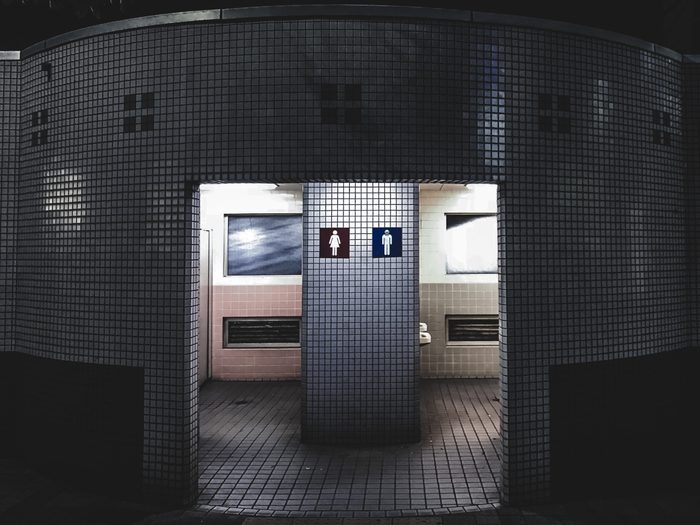
Public restrooms
If you can avoid public restrooms, it’s generally for the best due to how germy they typically are, but if not, watch closely for cleanliness, says Dr. Vyas. “If I’m going somewhere and I absolutely have to use a public restroom, I’ll pay very close attention to when it was cleaned,” she says. “And then if I’ve got to go, I’ll make sure that when I go in that I wash my hands and make sure that there are adequate paper towels. As I come out, I wash my hands again. I’m really careful now in certain public places. I try to avoid public restrooms, but if I have to, I take extra precautions.”
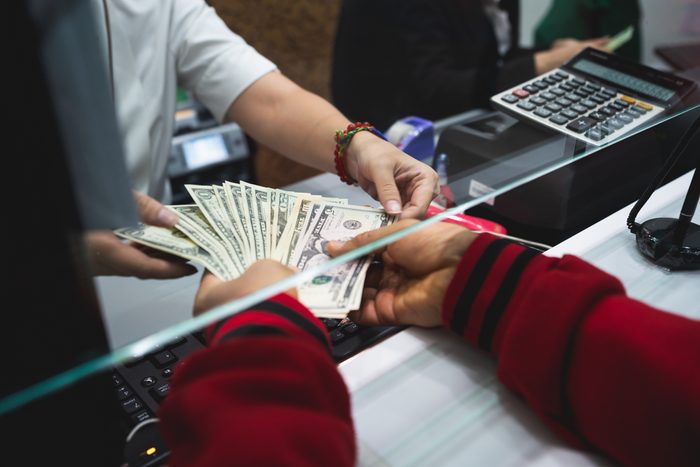
The bank
If you can handle most of your banking electronically, you may want to skip a trip to the teller if you can avoid it because money is already one of the dirtiest items we touch almost every day. An April 2017 study in PLOS One demonstrated that money can carry many different types of infectious germs. For that reason, it’s better to use credit and debit cards over cash to help reduce the risk of transmission. “I try to limit money, like cash,” says Dr. Vyas. “I think it’s better to use a credit card and clean it rather than cash, since, as we all know, money is very dirty. If you’re dealing with a lot of cash you have to be extra careful.”
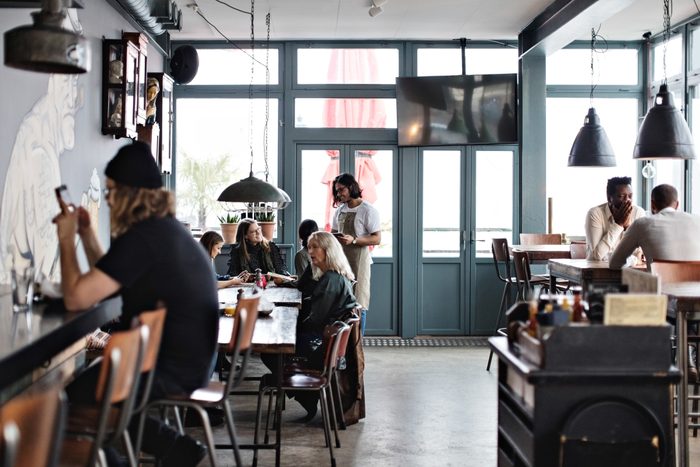
Small, crowded restaurants
A cozy café might have been your thing pre-Covid-19, but now you may want to think twice before booking a table in a cramped restaurant. “There’s not that much data, but just from a safety perspective, I think I would be very careful about going places where the tables are not spread out at a very safe distance,” says Dr. Vyas. “And I get it, you can’t wear masks while you’re eating, but I would want to see that the servers, waiters, and waitresses are wearing masks.” (Check out how to dine out safely at restaurants during Covid-19.)
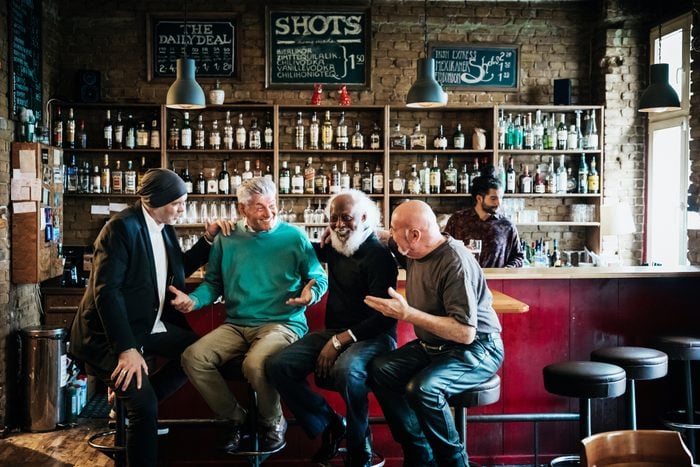
Bars
If you’re itching to head back to your local watering hole this summer, you may have to hold off a little longer. Dr. Cate suggests steering clear of indoor bars for now. “Indoor bars are actually pretty high risk because there are so many touch surfaces, like the door handles, countertops, and tables,” she says. “And I think it’s hard, especially in a crowded setting, for those surfaces to be de-sanitized between every customer. Plus, when people are drinking, they’re less cautious.” That said, if you stumble upon an outdoor bar, like on a patio or a deck, it’s less risky because you’re outside, and “droplet particles have so much more air to spread out in,” says Dr. Cate. “But again, you want to make sure that you are not touching multiple surfaces and that you can keep away from other people as much as possible. If you’re having some type of social event, have it outside rather than inside at a bar and do so with a smaller group of people, like up to ten.”

Churches
Like most other indoor spaces, Dr. Cate wouldn’t recommend it. But if your church is able to adapt to offer worship services under safer conditions, you might be able to still go. “A lot of places are really adapting, like the synagogue that I go to is having services outside and there’s a limited number of people that can attend,” she says. “They’re also sending out a health questionnaire beforehand and everyone has to wear a mask.” Find out if your place of worship is offering safer alternatives, and keep in mind, says Dr. Vyas, that “all parts of the service which require communal activities—shaking hands, hugging, passing trays and cups, sharing books and texts—would need to be discontinued.”
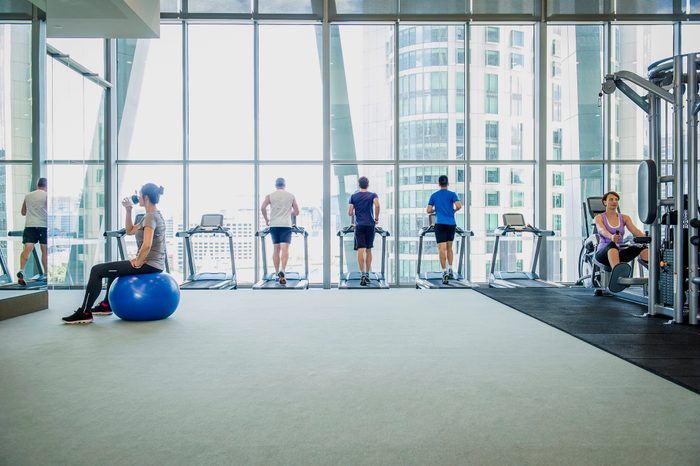
Gyms
Given all the sweating that goes on at a gym, you probably already know that gyms can be pretty germy places—even when there isn’t a global pandemic to contend with. A 2019 study in Sports Health: A Multidisciplinary Approach revealed that up to 25 percent of gym surfaces tested positive for drug-resistant bacteria and flu pathogens. The good news: When the gyms followed the study’s infection control protocols, they were able to wipe out the presence of the bacteria from nearly all surfaces. That said, every gym is different so you’ll need to weigh the risks for where you workout and make sure to disinfect all surfaces you touch, from the treadmill to the dumbbells. For those who like to exercise outside, Dr. Cate suggests going early. “I tell my older patients to go out and exercise early in the morning with a mask, as there are fewer people out and about,” she says. (Here are more tips on how to avoid Covid-19 at the gym.)
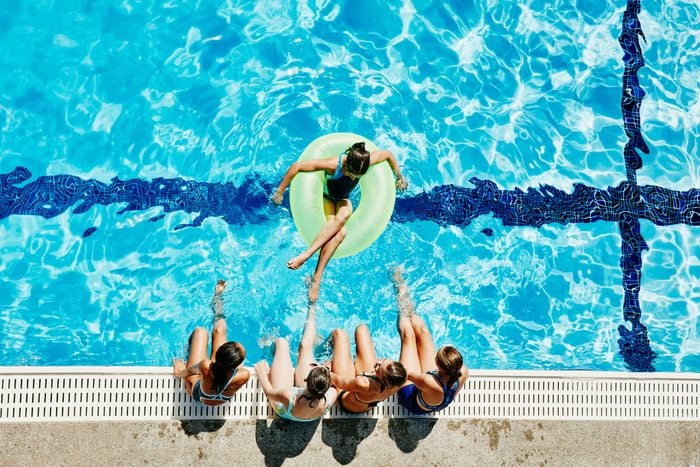
Public pools
While the Centers for Disease Control and Prevention says there’s not yet any evidence that coronavirus can be transmitted through water, hanging out at the pool still poses risks. “Water is definitely lower risk of transmission for Covid-19 and the chlorine alleviates a lot of the viral load, but if you’re in a crowded pool where everyone’s standing in the shallow end and breathing on each other, that’s not ideal,” says Dr. Cate. “I think that’s one of the reasons that the pools in New York City are not going to be open this summer is because there was no way to really socially distance everyone from each other.” If you want to hang out poolside, Dr. Vyas suggests that surfaces that people lounge on (think: beach chairs) should be cleaned frequently, “ideally before and after each person uses them,” she says. If you’re not able to maintain proper social distancing, Dr. Cate and Dr. Vyas recommend you skip the pool for now. But that doesn’t mean you have to forego a nice cool dip in the water. Dr. Cate says beaches are generally okay because it’s easier to socially distance from others than at a public pool. “There’s so much more space and so much more water—it’s reasonably safe to do,” she says. So skip the pool and head to the beach until we have a Covid-19 vaccine.

Spas
After being inside for months, we could all use a relaxing spa service to destress and indulge in a little relaxation. But Dr. Cate says trips to spas really depend on how long you’ll be there and what services you’re booking. “Quick services, like a haircut or a manicure, are okay because they require a limited amount of time and as long as both parties are wearing masks, I think it’s fine,” she says. That said, if you’re trying to squeeze in a full day at the spa or even a half-day of pampering, skip it for now. You’ll also want to avoid saunas and steam rooms. “The temperature is higher and can potentially create an environment much akin to a petri dish,” Dr. Cate points out. “It’s also really hard to sterilize those areas.”
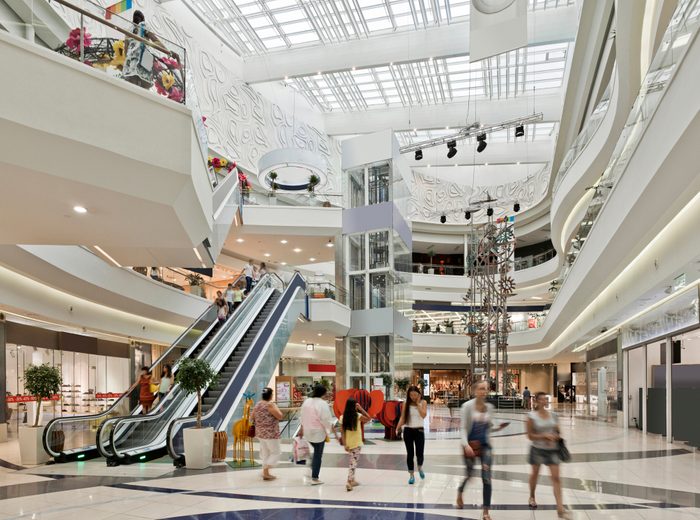
Malls
Like bars, malls have so many “high touch” surfaces that can easily be contaminated. And surfaces we didn’t think twice about touching before—the escalator railing, racks and racks of clothes, elevator buttons, literally everything in the fitting room—are all now potential sources of transmission. And depending on the amount of foot traffic a mall has, it may be difficult to disinfect all those surfaces between customers. “I would still be nervous about going into an indoor mall,” says Dr. Cate, who recommends sticking to curbside pickup for now. “I would stick with that for as long as possible or online shopping. I think it’s important for us to look at this as a long-term lifestyle adjustment until there’s a vaccine because it’s hard to control how often things are going to get cleaned or if they’re going to get cleaned at all.”
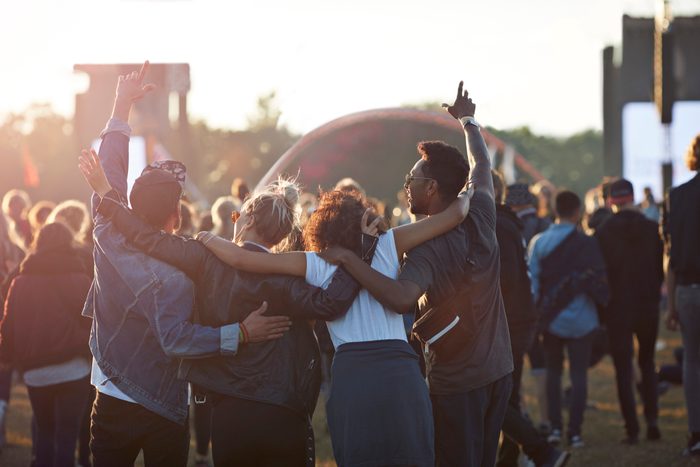
Concerts
While many states have canceled large outdoor gatherings this summer, if you’re contemplating attending one that hasn’t been shut down, doctors express caution. “I’d stay away from concerts and places where people tend to congregate,” says Dr. Vyas. “If I see an orderly line, like at Trader Joe’s and everyone’s spaced six feet apart, I’ll be fine. But if there’s just a mass of people, I’ll try not to go there.” While you may have the best intentions to remain six feet apart, it can be hard to do so when everyone’s crowded together trying to get a view of the stage. (Here’s how you can shop safely for groceries during coronavirus.)
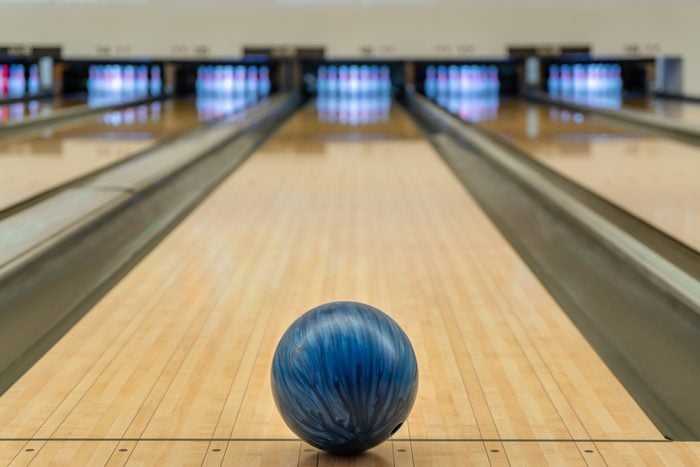
Bowling alleys
Skip ‘em, says Dr. Cate. Just think about all the surfaces that get touched in the course of one round of bowling. From the shoes you rent to the bowling balls that you touch, there are tons of opportunities for transmission, says she says. “It’s so hard for these places to clean in between guests and to really decontaminate—even the air filtration systems could be harboring the Covid-19.”
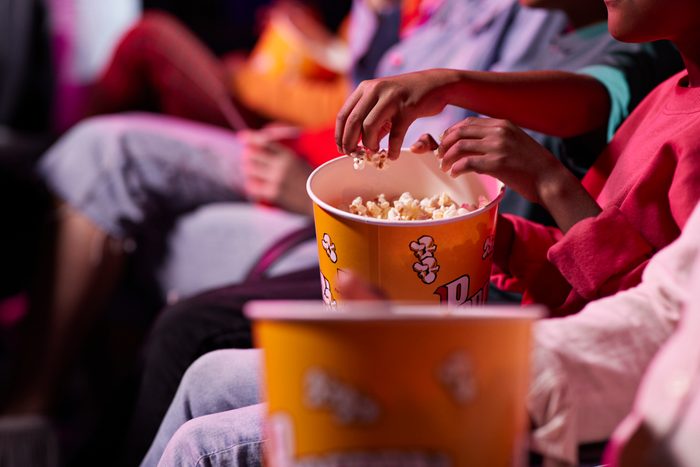
Movie theaters
These land on Dr. Cate’s no-go list for the same reason as many other places: You’re inside, in close proximity to others, and there are a ton of surfaces you can come in contact with, from the concession stand to the armrests. Plus, you’ve got other, safer options for entertainment, from streaming services (which have begun to release some current box office movies) and drive-in theaters. “I think drive-ins are a great idea,” says Dr. Cate. “You can watch it in your car with the family unit that you’ve been quarantining with. I’d be hard-pressed to go back to a movie theater right now. It’s probably a good idea to avoid it until we have a vaccine.”

Amusement parks
Like drive-in theaters and curbside pick-up at the mall, there are still ways to get your fix while adjusting to a new normal. “A lot of rides at amusement parks have shoulder straps and all types of buckles, which are, unless they’re metal, impossible to clean,” says Dr. Cate. While she doesn’t recommend traditional theme park activities, she says that drive-through safaris, like the ones offered at Six Flags, can be a fun, safe alternative.
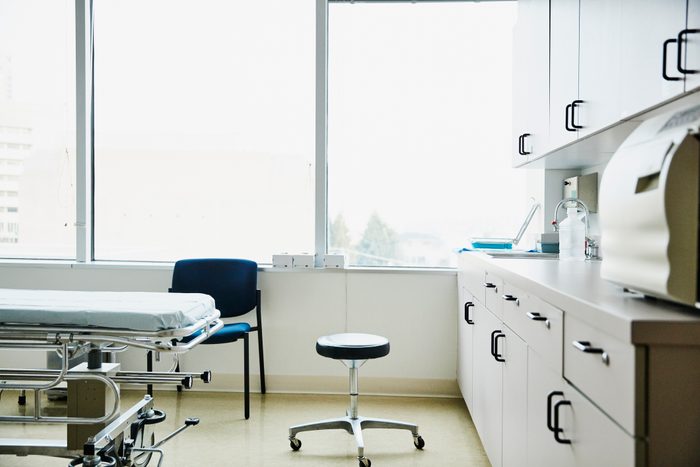
One place you should still go: The doctor’s office
“People are scared to come into doctor’s offices,” says Dr. Vyas. “We are doing everything we can to assure people that they’re safe. We got rid of a bunch of chairs in our office so that you’re not sitting near other people. We have signs everywhere to stay six feet apart. And yet I think there’s still some nervousness, and that’s quite worrisome because people are delaying needed medical care.” If you’re worried about risking exposure at the doctor’s office or clinic, but need to schedule a doctor’s appointment for treatment or a check-up or time-sensitive testing, like a colonoscopy or biopsy, call your doctor’s office first to find out how they can keep you safe instead of just putting it off. (Here’s what to expect if you’re doing a virtual doctor visit.)
